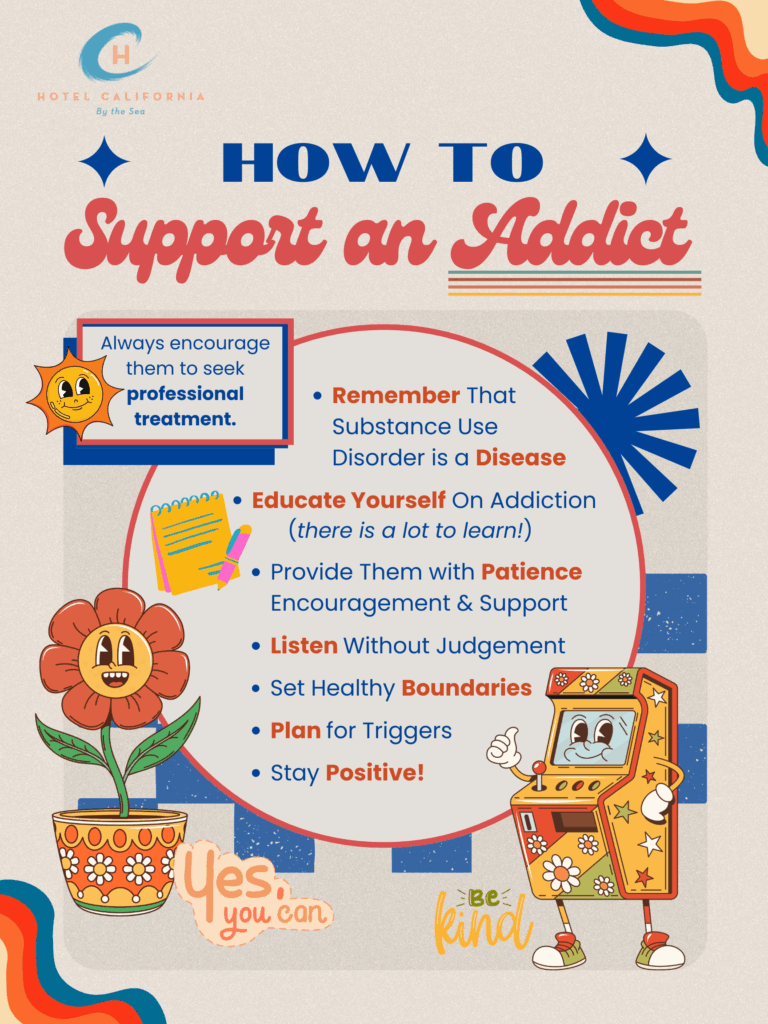How to Support an Addict
Addiction is a brain disorder that affects not only the substance user but also their entire community. The drug addict can be a friend, colleague or family member and can affect you as much as it affects them. Watching another person you care about go through the ups and downs of addiction can be distressing and even take a heavy toll on your own mental health and emotional well-being. What are effective ways to support an addict?

In a Pew Research Center survey in 2017, the study found that about half of Americans have had a family member or close friend who has been addicted to drugs. A substance addiction can be physical. This is when a person’s body becomes dependent on the drug and needs more of it to achieve the same initial effects. The person builds up a tolerance and when drug use has stopped, they usually go into signs of withdrawal.
A substance addiction can also be psychological. When a user’s mind begins to crave the feeling the drug produces, it fuels their emotional cup. They begin to enjoy the emotional state they are in when they are using drugs. When drug use has stopped, it often creates negative and even painful feelings such as depression and anxiety.
Why do people turn to drugs? What are the risk factors for drug addiction?
People begin using drugs for several reasons. They can also become addicted due to many different factors. Some use drugs to cope with emotional pain due to mental health problems such as depression, anxiety, or PTSD. This is called self-medicating.
Others are aware of their mental health issues but cannot seem to find an easier or more effective way to cope with their emotions. In some people, their mental illness remains undiagnosed and they begin by using drugs to manage specific symptoms. And others use substances as a way to fit in socially or to alleviate boredom and dissatisfaction with their lives. These groups are generally young and impressionable people who are often coaxed by peer pressure to do drugs or drink alcohol.
The rise in prescription medications like opioids and benzos has also contributed to the rise in drug addiction in the US. The ease of access and the normalcy of using medication have made it more acceptable to use drugs, leading to users being unaware of the dangers and consequences.

How to Support an Addict: What are the first steps?
There are many ways you can support an addict. The first step is to recognize that they may be using or abusing drugs. Are they experiencing problems at work or school? Have they developed any new health issues? Are you noticing any changes in mood or behavior? Are there any recurring financial issues?
Start to observe the person over a period of a few days or weeks. What are they doing that is different or out of the norm. Read and learn about the signs and symptoms of drug abuse. Look for drug paraphernalia. Papers, wrappers, tiny plastic bags, rolling papers, pipes, bongs, burnt foil, syringes or bottles of prescription medication. These are all types of tools to look out for when dealing with a drug addict.
How to start a conversation
Starting a conversation with an addict about their problem can be very difficult. But it is very important. Do not wait until your loved one has hit rock bottom before saying something. The earlier you can intervene, the better. There is a better chance of them receiving the help they need sooner rather than later.
Start by coming from a place of compassion and understanding. Express your concerns honestly and empathize with them. Let them know you are worried because you care. Listen to them even when you may not agree with what they are saying. Without arguing or contradicting their opinions, make sure your addict feels heard. Avoid lecturing them, threatening them or even bribing them. This could push them further into their drug addiction.
Do not talk to them while either of you is under the influence of drugs or substances. This could make it seem like not a big deal and undermine the seriousness of the issue.
Be prepared to be faced with denial. Your addict may get angry and defensive and refuse to discuss their drug issues. This is normal. Don’t expect a single conversation to fix the entire problem. The initial conversation is just the beginning of the journey to recovery. There is no quick fix when it comes to substance and alcohol addiction.
Check Your Insurance Coverage for FREE
Find out if your insurance covers addiction treatment in minutes. We accept most insurance!
Other ways in which you can support an Addict
- Educate yourself about addiction. Knowing what signs to look for, what to expect from the person and knowing that addiction is a disease that affects the brain, can give you a better understanding of how to help your loved one. Realize there is a lot to learn about having a substance use disorder.
- Offer your support. There is a difference between supporting an addict and enabling an addict. Supporting an addict will help them get through their addiction and recovery.
- Encourage them to seek out professional help or help through a support group. These types of treatments are more structured and can help the addict feel less alone and understood because others are going through similar experiences.
- Suggest treatment programs or facilities. The best way to overcome an addiction is with professional help that treats the addiction physically, emotionally and psychologically.
- Take care of yourself. If your addict refuses to get help or join a support group, take the initiative to join one yourself. There are support groups for families and friends of addicts that have helped people to better understand what their addict may be going through and effective ways they can cope in dealing with it. You may also need to limit your contact with them for your own well-being. Addiction impacts the entire community, not just the addict.
- Remember that addition is a disease. The addict is sick and they need help just like with any other medical disease.
- Understand that an addict needs to learn from their mistakes. It is ok to make mistakes and you don’t need to bail them out every time. Relapse is also a part of the recovery process. The addict may relapse a few times before finally getting sober.
- Understand that recovery is a lifelong process.
- Try to ensure your loved one is safe from physical or emotional harm.
- You can stage an intervention. This group effort, coming together with the help of a professional, can show a united front in wanting the addict to get healthier and better.
- Create a plan for triggers and cravings. These aspects of recovery are normal and you can help distract the addict with other things such as encouraging them to engage in new activities or learn a new hobby or skill.
- Adjust your expectations. Everyone person is different so their recovery will also be unique to them. This may mean the addict will start by cutting back at first before fully committing to full abstinence.
- Set boundaries and limits. Setting healthy boundaries will be helpful for your physical and emotional well-being as well as the overall well-being of the addict.
Reach out to Hotel California by the Sea
We specialize in treating addiction and other co-occurring disorders, such as PTSD. Our Admissions specialists are available to walk you through the best options for treating your addiction.
Treatment for Substance Use Disorder
Supporting a loved one with a substance use disorder can cause stress, test your patience and in some cases, strain you financially. It can leave you with feelings of guilt, shame, anger, fear, frustration and sadness all at the same time. Addiction not only affects the person who is addicted to drugs, but it also impacts family, friends, and the entire community. Professional treatment programs such as Hotel California by the Sea provide care to those with substance use disorders as well as their support system.
We offer treatment at all levels of care including detox, residential, PHP and IOP. We utilize evidence-based treatment methods such as CBT, group therapy and family therapy. Hotel California by the Sea is dedicated to helping clients reach their goals of sobriety and overcome their addiction.
References:
https://www.helpguide.org/mental-health/addiction/helping-someone-with-drug-addiction
https://www.urmc.rochester.edu/encyclopedia/content?contenttypeid=1&contentid=2255
https://www.butler.org/blog/5-tips-to-help-someone-struggling-with-addiction
https://www.healthpartners.com/blog/how-to-support-someone-through-substance-use-recovery
https://drugfree.org/article/how-to-help-a-friend-with-addiction/
